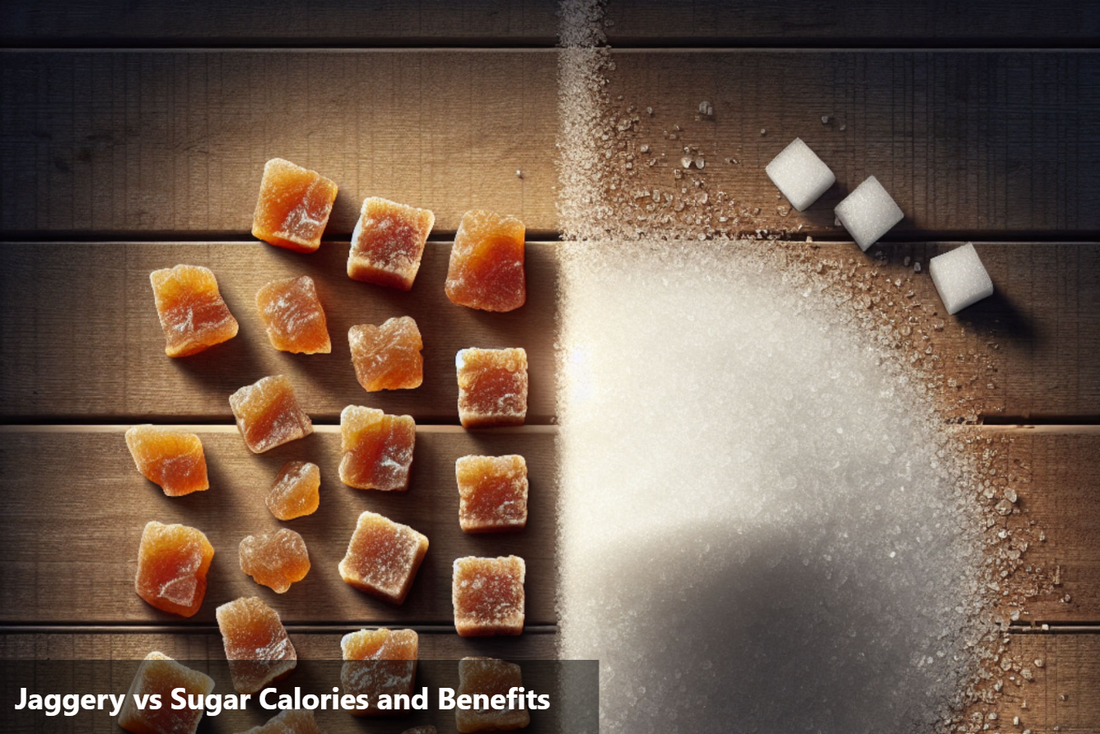Jaggery vs Sugar: Understanding the Calorie Differences
When it comes to sweeteners, the debate between jaggery and sugar often revolves around their calorie content. Jaggery, a natural sweetener made from sugarcane juice or palm sap, is believed to be a healthier alternative to refined sugar due to its slightly lower calorie content.
-
While both jaggery and sugar are high in calories, with jaggery containing about 383 calories per 100 grams and sugar around 387 calories per 100 grams, the minor variance may seem negligible but can make a difference in the long run.
It's crucial to comprehend the calorie disparities between jaggery and sugar to make informed choices about your sweetener consumption. By understanding the calorie content of these sweeteners, you can better manage your daily calorie intake and maintain a balanced diet. While jaggery offers certain health benefits due to its richness in essential minerals like iron and antioxidants, sugar is often associated with empty calories and adverse effects on health when consumed in excess.
Nutritional Comparison
|
Nutrient (per 100 grams) |
Jaggery |
Sugar |
|---|---|---|
|
Calories |
383 |
387 |
|
Carbohydrates |
98.96 g |
99.98 g |
|
Sugars |
98.96 g |
99.98 g |
|
Fiber |
0 g |
0 g |
|
Protein |
0.4 g |
0 g |
|
Fat |
0.1 g |
0 g |
|
Calcium |
80 mg |
1 mg |
|
Iron |
11 mg |
0.1 mg |
|
Magnesium |
70-90 mg |
0 mg |
|
Potassium |
1050 mg |
2 mg |
|
Phosphorus |
20-90 mg |
0 mg |
|
Sodium |
19-30 mg |
1 mg |
|
Vitamin B6 |
Trace amounts |
0 mg |
|
Antioxidants |
Present |
Absent |
Key Takeaways:
-
Calories and Carbohydrates: Both jaggery and sugar have similar calorie and carbohydrate content, making them equally energy-dense.
-
Minerals: Jaggery contains higher levels of essential minerals like calcium, iron, magnesium, potassium, and phosphorus compared to sugar.
-
Nutritional Value: Jaggery is richer in vitamins and minerals compared to sugar, which is almost devoid of these nutrients.
-
Sugars: Both have high sugar content, but jaggery also provides some trace nutrients and antioxidants.
Impact on Health
1. Blood Sugar Levels:
-
Sugar: Consuming refined sugar causes a rapid spike in blood glucose levels due to its high glycemic index, leading to quick energy bursts followed by crashes.
-
Jaggery: Although jaggery also affects blood sugar levels, it has a slightly lower glycemic index compared to refined sugar. This means it releases glucose more slowly into the bloodstream, causing less drastic spikes and crashes.
2. Metabolic Effects:
-
Sugar: High intake of refined sugar is linked to several metabolic issues, including obesity, insulin resistance, type 2 diabetes, and metabolic syndrome.
-
Jaggery: While still a high-calorie sweetener, jaggery’s additional nutrients and slower glucose release may offer slightly better metabolic outcomes compared to refined sugar. However, excessive consumption of jaggery can also contribute to similar metabolic issues.
3. Dental Health:
-
Sugar: Refined sugar is notorious for contributing to dental cavities and tooth decay by providing food for harmful oral bacteria.
-
Jaggery: Jaggery can also lead to dental issues if consumed in excess, though its less refined nature might make it slightly less harmful compared to pure sugar.
4. Digestive Health:
-
Sugar: Refined sugar offers no digestive benefits and can disrupt gut microbiota if consumed excessively.
-
Jaggery: Jaggery is believed to aid digestion and can act as a mild laxative, promoting bowel movements due to its trace mineral content.
5. Overall Health Impact:
-
Sugar: Regular consumption of refined sugar is associated with an increased risk of chronic diseases such as heart disease, type 2 diabetes, obesity, and certain cancers.
-
Jaggery: Jaggery’s nutritional profile is superior to refined sugar, providing some health benefits like improved digestion and minor boosts in mineral intake. However, the health advantages are marginal, and excessive consumption of jaggery can still contribute to similar health issues as sugar.
Usage and Recommendations
Incorporating jaggery or sugar into your diet mindfully can play a significant role in managing your calorie intake effectively. When considering the calories in jaggery vs sugar, it is essential to understand that while both are sweetening agents, they differ in terms of nutritional value.
To make the most out of your sweetener choice, moderation is key. Jaggery, a traditional sweetener, contains vital nutrients such as iron, magnesium, and potassium, offering potential health benefits compared to refined sugar. It is advisable to opt for jaggery when seeking a natural source of sweetness with added nutritional perks.
On the other hand, if your primary concern is calorie management and you prefer a sweetener with a more consistent flavor profile, sugar might be the suitable option for you. However, it is crucial to limit the intake of sugar to avoid excessive empty calories in your diet.
When deciding between jaggery and sugar, consider your individual health goals. If you aim to boost your nutrient intake while sweetening your dishes, jaggery could be the better choice. For those focusing on strict calorie control, sugar may be the preferred option. Ultimately, striking a balance and making informed decisions based on your health objectives will guide you to the most suitable sweetener for your needs.
This Blog post is an initiative by DiabeSmart, to provide accurate and Nutritionist / Doctor approved information related to Diabetes. DiabeSmart is India's first Food brand designed specifically for Diabetics, that has been clinically tested on Diabetics and Pre-Diabetics to deliver 55% - 70% lower Sugar spikes. DiabeSmart is part of Lo! Foods - India's leading brand for Everyday Functional Health foods.















